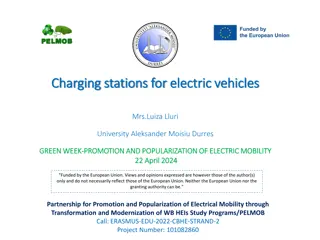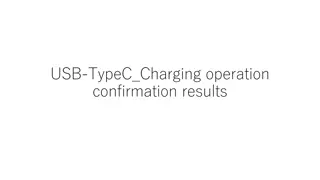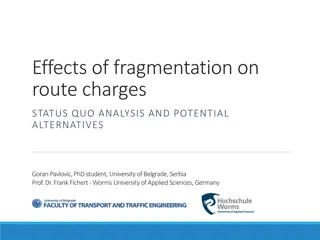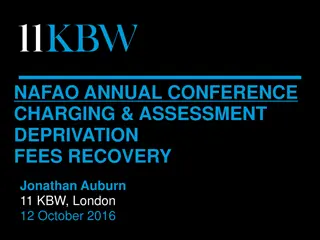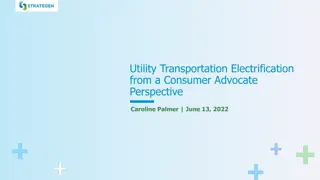Proposed Changes to Adult Social Care Charging Policy
The Adult Social Care Charging Policy in Brent outlines how the council charges for care services, ensuring fairness and affordability. While proposed changes aim to ensure sustainability, key principles include financial assessments, affordability checks, and support for maximizing income. The government's planned changes are currently on hold, allowing local discretion in policy implementation.
Download Presentation

Please find below an Image/Link to download the presentation.
The content on the website is provided AS IS for your information and personal use only. It may not be sold, licensed, or shared on other websites without obtaining consent from the author.If you encounter any issues during the download, it is possible that the publisher has removed the file from their server.
You are allowed to download the files provided on this website for personal or commercial use, subject to the condition that they are used lawfully. All files are the property of their respective owners.
The content on the website is provided AS IS for your information and personal use only. It may not be sold, licensed, or shared on other websites without obtaining consent from the author.
E N D
Presentation Transcript
Proposed Changes to Adult Social Care Charging Policy
What is the Adult Social Care Charging Policy? Local authorities are allowed to charge people for the adult social care services they receive. Brent s Adult Social Care charging policy is the framework that sets out how the council does this. The Care Act 2014 contains provisions that enable councils to charge for care services. Of 32 London boroughs, 31 charge for care services. Brent is not unusual in charging for care services. The council s charging policy has been reviewed and it is proposed that elements of the policy will change. This will not have an impact on all service users, but it is important that people receiving social care services are aware of the changes and are able to give their views on what is being proposed.
What is the Adult Social Care Charging Policy? There are some important principles that guide the way Brent charges for care services Everybody who receives an adult social care service has a financial assessment, which works out whether they have to pay towards their care. Nearly 50% of people receiving care services pay no charge at all. Nobody will be expected to pay more for care than they can afford. Nor will anybody be expected to pay more than the cost of delivering their care package. The council supports people to maximise their income and also takes into account expenditure that people incur because of their disability or vulnerability, and disregards this expenditure when working out care charges.
What is the Adult Social Care Charging Policy? The Government had planned to make some fundamental changes to the legislation relating to charges for adult social care the introduction of a life-time cap on the contribution that a person would have to make towards their adult social care costs; and changes to the savings and capital thresholds which determined whether people contributed to their care costs. These changes are on hold, with no plans to implement them. Council s retain some local discretion in how they implement their adult social care charging policy, as long as they follow the Care Act legislation. For example, Brent is able to offer a more generous scheme than set out in legislation and guidance, and will continue to do so, which supports service users contributing to the cost of their care services as well as recognising local need. However, in order to ensure that social care services remain sustainable, the council is consulting on changes to the charging policy that could result in some people paying more for care services.
A focus on sustainability and independence The charges that the council implements for its adult social care service are essential to ensure that the service remains sustainable in the years to come. Without the income from service user charges, adult social care services would not be sustainable. The council needs to consider ways of increasing income to support the delivery of care services. The council is placing greater emphasis on preventative services and supporting people to remain as independent as possible for as long as possible. For example, greater investment is being made in our reablement service. Reablement is a free, short-term service to support people regain skills and independence to enable them to live without care. Whilst it is a well-established part of the council s hospital discharge process, more resources are being put into the service to make it a greater part of the community offer to maintain independence and prevent the need for ongoing support.
How charges are calculated Any person with savings above 14,250 makes a contribution to their care costs. 14,250 is the lower threshold for savings, 23,250 the upper threshold. If a person holds savings above this amount, they will fund their care in full. Income is also taken into account. There is a minimum level of income which a person must be left with after charges are deducted. For care home residents, this is called the Personal Allowance and is currently set at 28.25 per week.
How charges are calculated For people receiving care in their own homes, the amount of income to be retained is called the Minimum Income Guarantee (MIG). The MIG varies depending on a person s circumstances age and whether they are single or part of a couple. Some examples - For a single person who is over the age of 65, it is 201.05 per week. Brent adds 25% to this amount, taking it to 251.31 per week. For a single person over 25, but less than 65, it is 144.20. The 25% enhancement takes this to 180.25 per week You are in a couple where one or both of you are of pension credit age or over it is 148.65, plus 25% - 185.81 The proposed changes to the policy will have an impact on the Minimum Income Guarantee in Brent (i.e. people who receive homecare) but not the Personal Allowance.
What Changes are being proposed? 1. Changes to the Minimum Income Guarantee Brent currently adds a discretionary 25% to the Minimum Income Guarantee for people who are receiving homecare or other services in the community. It is proposed to retain a discretionary enhancement, but to reduce this to 10%. This, still provides a more generous policy for Brent than required, reflecting that charging is a local matter and Brent can set a MIG that supports local need. The proposal to retain a 10% enhancement follows discussions within the council about retaining a level of enhancement that supports people who contribute to their care costs, but also supports the council s aim to ensure services remain sustainable. Residents will still receive a discretionary enhancement to their Minimum Income Guarantee, but not at the level currently provided. This proposal would affect all service users that contribute towards the cost of their homecare, but would still provide a basic living allowance above that required in the guidance on charging for care services.
What Changes are being proposed? Case Study Mr Patel Mr Patel is a single adult living alone and is aged 83. He has a weekly income of 400. Because of his circumstances his Minimum Income Guarantee is 201.05 per week. Currently Brent adds a 25% discretionary enhancement to this, to leave his MIG at 251.31. This leaves an assessable income of 148.69, which would be the maximum contribution to his care. By changing the enhancement to 10%, his Minimum Income Guarantee would become 221.20 per week, leaving an assessable income of 178.80 per week. Consequently, this is the maximum charge that Mr Patel could now pay towards his care. Mr Patel s homecare package costs 175 per week. Under the current charging arrangement, he pays 148.69 per week towards this. Under the proposed arrangements, his contribution would increase to 175 per week.
What Changes are being proposed? 2. Increasing the amount charged to service users if they do not participate or cooperate with their financial assessment. Some service users do not participate or cooperate with the financial assessment process. It should be noted that most people do, and are charged the correct amount for their care. Where someone does not take part in the assessment, the council is proposing to charge people the full cost of their care, if after four weeks they have not provided the information needed to complete the financial assessment. Brent Council uses a light-touch assessment process, which enables most financial assessments to be completed in 48 to 72 hours of a referral. When an assessment takes longer than that, with the cooperation of the service user, the council charges an average contribution for care until the assessment is complete. This will rise to 32.52 per week, whilst the assessment is completed.
What Changes are being proposed? 3. (i). Increasing the hourly rate charged for homecare from 12.97 per hour to the cost of commissioning care. (ii). That an annual uplift is applied to the hourly rate charged for homecare in line with the increase given to providers, so that the charge continues to reflect the amount paid to providers on an hourly basis. The current cost of homecare is 20.50 per hour for contracted services, or 17.50 an hour for spot placements. The hourly charges have fallen behind the actual costs of care, and in not charging the full amount it is having an impact on the sustainability of services. This change would have an impact on 270 people who pay their care costs in full (self- funders). All will be re-assessed to ensure that they can afford the new costs of care nobody will be expected to pay more for care than they can afford.
What Changes are being proposed? Another group of service users that could be affected by this change are those people for whom the cost of their care package is less than their capped contribution. These will be people with low incomes, but receive a small care package (i.e. around 2 hours of care per week). The council will look to engage with them before the changes are introduced to see what can be done to support them, such as looking at disability related expenditure options and benefit maximisation to help those who came forward with issues because of this change.
What Changes are being proposed? Case Study Mrs Thomas Mrs Thomas is 72 years old, married and lives with her husband in a home that they jointly own. Mrs Thomas has a personal income of 500 per week. Her husband s income, as well as her home, are not taken into account during her financial assessment as she receives a homecare service. Mrs Thomas has a Minimum Income Guarantee of 148.65 per week. Therefore, her assessable income is 351.35. She receives seven hours of care per week, and currently pays 90.79 per week for this. If the hourly rate for care is increased to the cost of care, 20.50 an hour, the cost of her care package would increase to 143.50 per week. As the cost of care is still less than her assessable income, Mrs Thomas will remain a self-funder and will have to pay the full cost of care.
What Changes are being proposed? Case Study Mr Ali Mr Ali has an income of 235 per week. After the council disregards his disability related expenditure and other living costs, he is left with 210 per week. His minimum income guarantee is 180.25 per week, leaving his with an assessable income of 29.75 per week. He is receiving a care package at home which consists of two calls per week, for an hour each. He pays 25.94 per week for this care. As the hourly cost increases to 20.50 per hour, the cost of Mr Ali s care will increase to 41 per week. His contribution has will increase to 29.75 per week, with the council paying the rest. The council will work with Mr Ali to support him to see what can be done to help maximise his income to pay the additional charge, as well as consider whether he would benefit from a short term reablement care package to try and reduce the need for ongoing care.
What Changes are being proposed? Ms Campbell Ms Campbell is 36 years old and receives four hours of care per week. The current cost of her care package is 51.88 (four hours care @ 12.97 per hour). Her total income is 237.10 per week and after disregarded income is taken into account, her assessable income is 203.45 per week. Without the Brent 25% enhancement, Ms Campbell s Minimum Income Guarantee would be 144.20, but with the enhancement it is 180.25 per week. Therefore, the contribution Ms Campbell makes towards her care is 23.20 per week ( 203.45 - 180.25 = 23.20 per week). The impact of the change to the discretionary uplift on the Minimum Income Guarantee and the change to the hourly rate for homecare for Ms Campbell will be Her assessable income remains 203.45 Her Minimum Income Guarantee will become 158.62 The cost of the care package increases to 82 per week ( 20.50 x 4 hours) Ms Campbell s contribution increases to 44.83 per week the change to the hourly rate does not affect her contribution, but the change to the MIG does
What Changes are being proposed? 4. Charges during admissions to hospital (i). Charging homecare service users for up to seven days after a hospital admission, (ii). Charging service users for 28 days after being admitted to hospital from a residential or nursing home. Both of these changes bring the charging policy into line with payments to providers, who continue to be paid to keep open homecare packages and care home placements. For homecare service users, this ensures that there care agency is ready to support them on discharge from hospital; for care home users, it ensures that their placement is available to return to when they leave hospital.
Financial Assessment The impact of these changes will be different for people receiving social care services. All service users will have a new financial assessment ahead of April 2024 to determine whether they may have to pay more towards their care when the changes are implemented the impact will not be uniform, hence the need for individual financial assessments. Brent Council is focussed on supporting people to maximise their income, and it will be an important mitigation for those impacted by these proposals. There are services available for those who are seeking to Claim housing benefit or seek support with housing costs Receive support with council tax payments Claim support for electric, gas, water and other household bills. Further information is on the Brent Council website - https://www.brent.gov.uk/benefits-and-money- advice
Consultation Proposals A targeted consultation and engagement with adult social care service users, their carers and families will take place to seek views on these proposals. The consultation will run from 2nd November to 17th December 2023. Information on the changes will be sent to all ASC service users, along with details on how to respond to the consultation online, or in writing. Public meetings will be arranged in the five Brent Connect areas Kingsbury, Wembley, Willesden, Harlesden and Kilburn. Meetings will also be held with stakeholders, such as CVS Brent, provider organisations and advocacy groups. Offers will be made to established forums, such as Brent Disability Forum, Pensioners Forum, Carers Partnership Board etc to attend their meetings to discuss the proposals and seek their views. The findings will be collated, analysed and presented to Cabinet for a final decision on the changes to be implemented in January 2024. Changes to the policy would happen from April 2024 onwards.
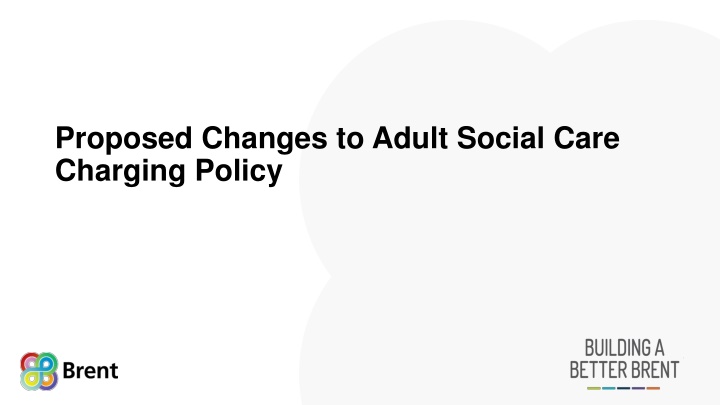





![Long-Range Wireless Charging Market Report & Analysis _ BIS Research [2024-2035]](/thumb/87166/long-range-wireless-charging-market-report-analysis-bis-research-2024-2035.jpg)





